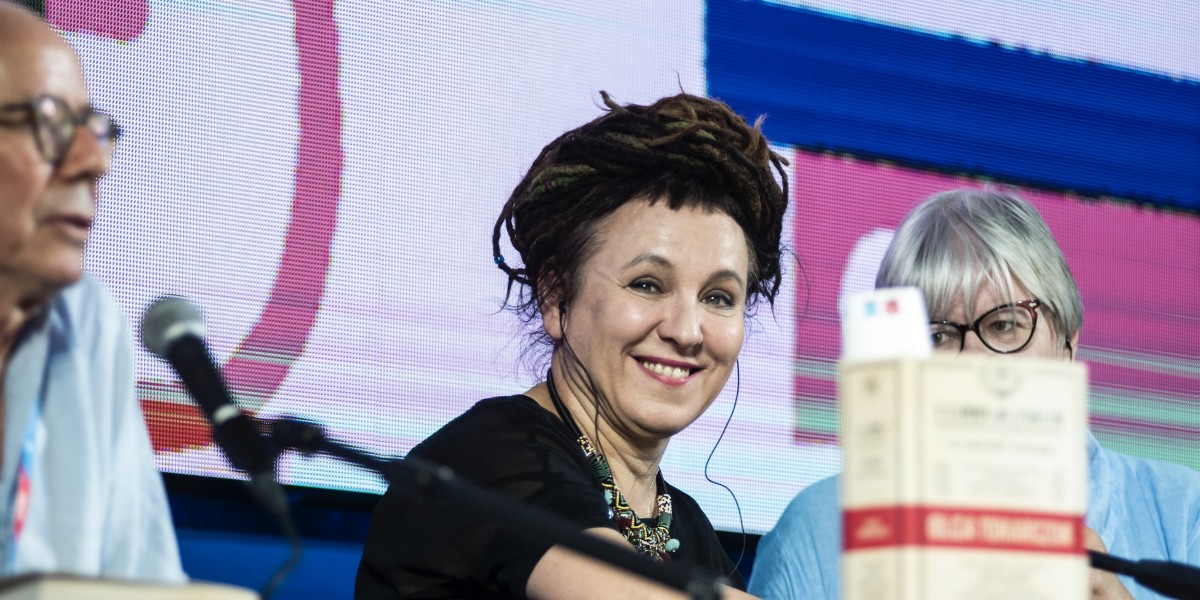
A multitude of subversions are lost and found again in The Books of Jacob
Olga Tokarczuk needs no introduction. Closing Festivaletteratura’s twenty-seventh edition, Wlodek Goldkorn gives her a 10-minute one. The crowd in the sold-out marquee murmurs, it’s clear that many share the journalist’s affection for Olga and her work. And so the anticipation grows, finally released into warm applause at her first words, thanking her audience.
It is objectively hard, though, to concisely describe what Tokarczuk's The Books of Jacob represents, to its readers and to literature. It is an absolute masterpiece, “written in a kind of Polish no other writer has managed in at least a century”, Goldkorn observes. One of the two translators responsible for the Italian edition, now out for Bompiani, later illuminates why: “It’s the subtle complexity of Olga’s prose. Two or three sentences would go by and you’d think this book is an easy read, and then suddenly a miracle happens in the next line, and you are transported to another dimension”.
Centred around Jacob Frank’s heretic journey, starting out from a small village in 18th-century Poland, the book’s own journey began with Olga Tokarczuk’s love of historical research. She rediscovered what would become the backbone of this novel thanks to the transcriptions of Frank’s teachings. They were waiting for her, covered in dust in a tiny bookshop. In the train back home, a question took form more and more pressingly. “Why didn’t I know about this fascinating, unusual, at times even insolent story?”, she asks; what leads some stories to being literally lost to dust?
Jacob Frank straddled Islam, Christianity and Jewish mysticism, causing discomfort to the big narrations heralded by each religion. Frankists, as its followers are known, disappeared after their leader’s demise, abandoning his teachings to blend into mainstream society in Poland, France, and Germany. Between these two chronological extremes lies a forgotten story of messianic delusion, borders crossings, identity changes, twists and turns, action.
You think you are joining in the ultimate on-the-road novel and, at the same time, Olga encourages you to “google for more”, be a researcher just like her. Beware, she thought this book would take one year. It took eight years of research and writing to complete the 900-plus page, 1.2 kilo book. After finishing it, she fell ill. At one point, to relieve her symptoms, she tried Chinese medicine in Kraków. "What did you do to lose so much of yourself?", the doctor asked after an intense examination. "I wrote a book" was her reply.
Poignantly, Tokarczuk does not let Jacob Frank be the sole narrator of a story that took so much out of her. Feminist and post-colonial perspectives, of which Tokarczuk's work is infused, gift us with a multiplication of standpoints, something “paramount” in The Books of Jacob. The book started traditionally with a third-person narrator, Olga recounts. Then she added more. Then came a first-person narrator. “And then I understood I needed another kind of narrator, a fourth-person one”.
The reference is to the omniscient visions of Jacob’s grandmother, a character who knows “the past, present, and future, who even knows me, the author, somehow”. Just don’t call it magical realism: “I hate, hate the words”, Tokarczuk is eager to point out, smiling. “It was the only way for the story not to belong to me anymore”.



